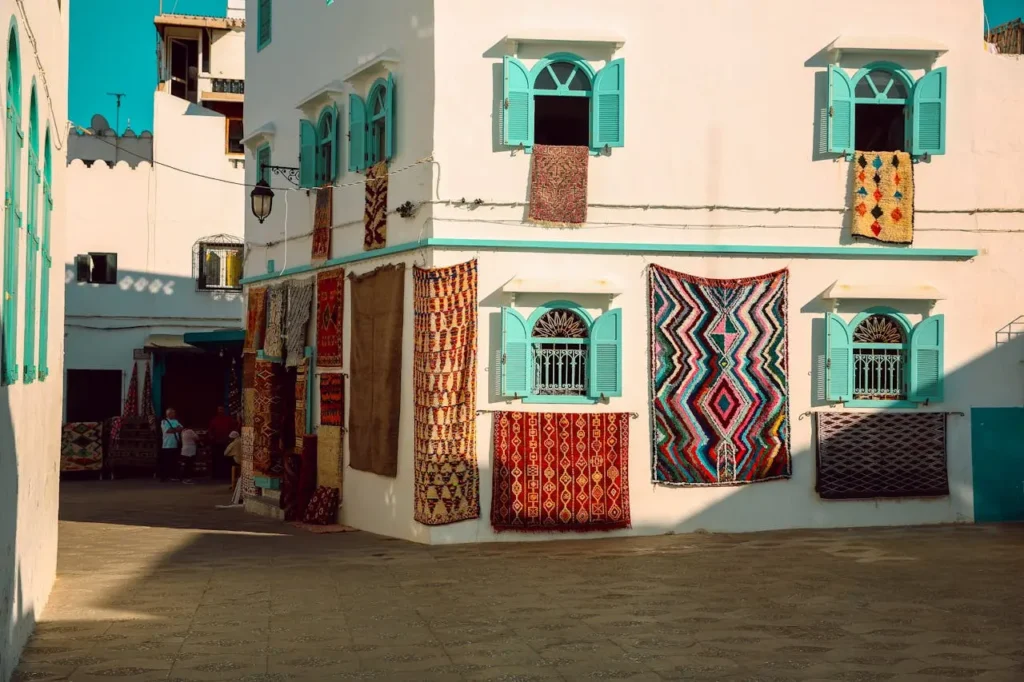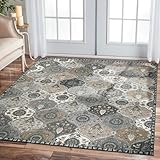
As a former Moroccan goods seller through Moroccan Gift Shop, I’ve sourced and handled countless rugs from artisans in Marrakech and Fez. Now, through my blog, I often address the question: are Moroccan rugs safe? Whether you’re considering a Berber or Beni Ourain rug for your home, safety involves materials, dyes, and potential health risks like allergens or chemicals. Here’s a practical guide for 2025, based on my experience and industry insights, to help you choose wisely.
If you’re curious to know how much it costs to ship a Moroccan rug from Morocco to the rest of the world I wrote a full guide here.
Are Moroccan Rugs Safe for Your Home?
Moroccan rugs are generally safe and durable when authentic and well-made, adding warmth and style without major risks. However, safety varies by quality and production methods. High-quality rugs use natural materials that are non-toxic and eco-friendly, while cheaper, mass-produced versions may incorporate synthetic dyes or chemicals that could pose health concerns.
Key factors include:
Materials: Most traditional Moroccan rugs are handwoven from wool, which is naturally flame-resistant, antimicrobial, and biodegradable. Wool can trap dust and allergens but is hypoallergenic for many people.
Dyes: Natural dyes from plants and minerals (like henna, indigo, or saffron) are safe and non-toxic. Synthetic dyes in low-end rugs might contain harmful chemicals like azo compounds, which can release volatile organic compounds (VOCs) or cause skin irritation.
Construction: Hand-knotted rugs are sturdy and less likely to shed fibers that could irritate airways.
If sourced from reputable artisans, Moroccan rugs meet safety standards similar to other natural-fiber rugs, with no inherent toxicity.
Common Health Concerns with Moroccan Rugs
While authentic rugs are safe, here are potential issues to watch for:
Allergens and Respiratory Issues: Wool rugs can harbor dust mites, mold, or pet dander if not cleaned regularly, triggering allergies or asthma. New rugs might off-gas mild odors from natural wool, but this fades quickly. Synthetic versions could emit VOCs like formaldehyde, leading to headaches or irritation.
Skin Sensitivities: Poor-quality dyes may cause contact dermatitis. Natural-dyed rugs avoid this, but always check for colorfastness—rub a damp cloth on the rug to test for bleeding.
Chemical Exposure: Some imported rugs use flame retardants or pesticides during production, which are linked to long-term health risks. Opt for organic or chemical-free certifications to minimize this.
Child and Pet Safety: Moroccan rugs are non-slip if placed on a pad, reducing fall risks. Their dense weave makes them tough against claws or play, but avoid rugs with loose fibers that could be ingested.
In my experience, issues arise more from fake or factory-made rugs than genuine artisan pieces. Vintage rugs might have accumulated allergens over time, so professional cleaning is key.
How to Choose a Safe Moroccan Rug
To ensure your rug is safe:
Go Natural: Select rugs made from 100% wool with vegetable dyes. Labels like “natural dye” or “organic wool” indicate low chemical use.
Check Certifications: Look for OEKO-TEX or GOTS standards, which test for harmful substances.
Buy from Trusted Sources: Artisans in Morocco or reputable sellers avoid toxic shortcuts. Avoid suspiciously cheap rugs, as they often use dead wool (chemically treated) that sheds and smells.
Test for Quality: A good rug feels soft yet resilient, with even knots and no strong chemical odors.
Maintenance Tips: Vacuum regularly, spot-clean with mild soap, and air out in sunlight to prevent mold. Professional deep cleaning every 1-2 years keeps allergens at bay.
If you have allergies, start with a small rug to test reactions. For homes with kids or pets, add a non-toxic rug pad for extra safety.
The Bottom Line
Are Moroccan rugs safe? Yes, authentic ones made with natural wool and dyes are non-toxic, durable, and health-friendly, offering benefits like insulation and air purification. Risks stem from poor-quality imports with synthetic chemicals—stick to certified, artisan-sourced rugs to avoid them. Visit moroccangiftshop.com for more guides or to share your rug questions!
Last update on 2026-01-18 / Affiliate links / Images from Amazon Product Advertising API
